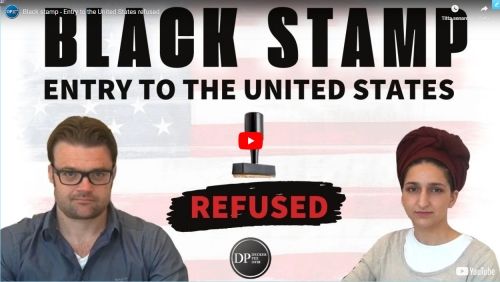Please read about all this and more in this article by attorney Michael Decker, a founding partner at Decker, Pex, Levi one of Israel’s leading offices in immigration law.
What is the act of Deportation from the US?
Deportation is the act of forcing a person to leave the US, and prohibiting them from returning to it – sending them back to their home country. In most cases, deportation occurs when an individual has violated US immigration laws; this can include entering the country illegally, overstaying a visa, or committing a criminal offense. Deportation might also occur when an individual’s immigration status changes or they become undocumented due to a change in law or policy. Deportation and its consequences have recently become a major point of contention in the current US political climate, as deportation policies are being tightened – causing fear and anxiety among immigrants in the country. 
Can a US citizen be deported from the country?
Under the 14th Amendment to the US Constitution, the government cannot revoke the citizenship of a natural-born US citizen. Generally, also a naturalized US citizen cannot be deported. However, there are certain circumstances where a naturalized citizen might be stripped of their citizenship – this act is known as “denaturalization”, and may even lead to deportation. The federal government will demand a high level of proof when attempting to revoke an individual’s naturalization. The following acts might cause the US authorities to denaturalize and deport you from the US:
- Misrepresentation or concealment of material facts – this may occur if you deliberately deceived the US immigration authorities in your naturalization application interview about material facts. For example, if you deliberately concealed the fact that you were previously convicted of a serious crime in another country.
- Illegal procurement of naturalization – if you obtained your citizenship illegally (e.g. through fabricating evidence), then that citizenship will be revoked because you did not meet or failed to comply with all of the statutory requirements for naturalization in the first place.
- Membership in prohibited organizations – if you became a member of or affiliated with certain prohibited organizations within 5 years after your naturalization process, your citizenship can be revoked. These organizations typically include terrorist groups or organizations involved in advocating or engaging in violence against the US.
What are the reasons for deportation from the US?
The grounds for deportation/removal from the US are outlined in Section 237 of the Immigration and Nationality Act (INA). Some of the most common grounds for deportation include:
- Violating your visa: this could include overstaying your visa or working without authorization. For example, the E-1 Treaty Trader is allowed to stay in the US for 2 year periods. If you overstay this time period in the US, without extending it, you will be considered to be “unlawfully present” in the country, and might be deported.
- Criminal convictions: Under US immigration law, the term “conviction” has a broader meaning than its usual meaning in criminal law. In this context, a conviction refers to a formal judgment of guilt entered by a judge or jury, a plea of guilt or no contest to a crime or even a conviction that is later annulled. More so, even if you admit to an act that could constitute a crime, which you were never convicted for in a court of law (for example, if the act was mentioned as part of a plea bargain) – it can serve as a ground for deportation from the US.
- Drug offenses – you can be deported from the US for drug offenses, even if you were never convicted for them. The INA lists drug offenses as a ground for deportation. These include:
- Possession of a controlled substance – i.e. having drugs in your possession, even if you did not intend to use them.
- Use of a controlled substance – using drugs, even if you did not possess them.
- Conspiracy to possess or use a controlled substance – planning to possess or use drugs, even if you did not actually do so.
- Importation or exportation of a controlled substance – bringing drugs into the United States or taking them out of the country.
- Threat to security – If you are considered to be a security risk by a government agency (such as the Department of Homeland Security (DHS), the FBI or the CIA), or involved in terrorism or espionage – you may be deported.
- Fraud – The specific types of fraud that can lead to deportation include:
- Fraudulent entry into the United States – i.e. entering the United States using false documents or by lying to immigration officials.
- Fraudulent marriage in order to obtain a Green Card.
- Fraudulent adjustment of status – adjusting your immigration status to a more permanent status using false documents or by lying to immigration officials.
- Fraudulent naturalization – as mentioned above, this act may lead to denaturalization and deportation.
- Benefit fraud – fraudulently obtaining or misusing government benefits or programs. For instance, using altered documents in order to misrepresent eligibility for public assistance, welfare programs, or healthcare benefits.
- Failure to disclose an address change – although this may seem like an insignificant act, you can be deported from the US for failing to update the United States Citizenship and Immigration Services (USCIS) about your address change. This is because USCIS needs to be able to contact you in case of any immigration-related matters. The law requires that non-citizens notify the government of their address change within 10 days of the change.
What is the process of Deportation from the US?
There are 2 main tracks in the deportation process – one is for individuals who receive a Notice to Appear (NTA) and the other is for individuals who are arrested and detained:
- Removal beginning with NTA – the NTA is a charging document, sent to an individual’s address. The NTA will list the reasons why the DHS is seeking to remove the individual from the United States, and it will also specify the date and time of the individual’s first hearing before an immigration judge.
The first hearing in immigration court is called a “master calendar hearing”. At this hearing, the immigration judge will review the NTA and determine whether the individual is eligible for certain forms of “Relief from Removal”, such as asylum or withholding of removal. If the individual is not eligible for relief, the immigration judge will set a date for a “merits hearing”; this hearing is the “main event” in immigration court, where both sides will have the opportunity to present evidence, including witness testimony, and make legal arguments. The immigration judge will then decide whether to grant the individual relief from removal or to order them removed from the US.
If the hearing goes against you, you will be issued a document, known as the “Bag and Baggage” letter; it is called so because it tells the immigrant to pack his/her bags and be ready to leave the country within a time period of about 30 days.
- Removal process beginning with arrest and detention – this removal process involves an arrest of an individual by Immigration and Customs Enforcement (ICE) or another law enforcement agency. ICE can also detain an individual who is already in custody on another charge. The individual will have the opportunity to challenge their detention at a bond hearing. If the individual is granted bond, they will be released from detention and allowed to live in the community while their case is pending. If the individual is not granted bond, they will remain in detention until their removal hearing.

How can you appeal a decision on Deportation from the US?
If an immigration judge determines that you to be deported, you will be given the option of accepting the order of removal or applying for relief from removal. Once the immigration judge makes a final ruling on your removability and on your application for relief, you or the DHS may appeal that decision to the Board of Immigration Appeals (BIA) within 30 days from the judge’s decision. The BIA will review the record of the case and decide whether to uphold the decision of the immigration judge.
BIA appeals are largely “paper appeals”, with limited exceptions, meaning that they do not consist of oral arguments or hearings. If the BIA upholds the decision of the immigration judge, the individual may then appeal the decision to a federal circuit court of appeals, within 30 days of the BIA decision. The federal court will review the decision of the BIA and decide whether it was correct. Unlike an appeal to the BIA, this appeal will not automatically stop the deportation. If you file such an appeal, you will also need to request a “stay of removal” which, if granted by the court, prevents deportation while the petition for review is pending at the federal court. If a granted a stay of removal is not granted, the individual may be deported at any time including before the appeal is heard.
What is Voluntary Departure from the US?
Voluntary Departure from the United States is an option provided to certain individuals, by the discretion of an immigration judge – either while or prior to removal proceedings. You might receive a letter in the mail that says you are given the opportunity to leave the country without being ordered to go, hence without being formally deported. In some cases, that is the best possible outcome: if you voluntarily leave the country, you will most likely not be barred from legally re-entering the US in the future. Also, a grant of voluntary departure typically has a deadline of either 60 or 120 days (as opposed to 30 days in a “regular” deportation). This allows individuals to prepare for their departures.
What is Expedited Removal from the US?
Expedited removal is a fast-track deportation process that allows the US government to rapidly (in as little as 24 hours) deport non-citizens from the country without a hearing before a judge, if:
- The person is suspected of being in the US unlawfully, and
- They cannot prove that they have been in the US continuously for at least two years.
This process usually begins when the non-citizen is apprehended by US Customs and Border Protection (CBP). During the expedited removal process, a CBP officer conducts an interview to determine if the individual has a valid claim for admission or protection. If the officer determines that the person is inadmissible or lacks a valid claim, they can issue a removal order, and the individual is typically detained and removed from the US as quickly as possible.
Individuals subject to expedited removal generally have limited legal recourse and fewer opportunities to present their case compared to those who go through regular removal proceedings. However, individuals who express a credible fear of persecution or torture upon return to their home country may be referred to a more thorough assessment of their asylum claim.
Contact an immigration lawyer regarding Deportation from the US
Experiencing complications with your immigration status in the US can be incredibly challenging and unnerving, and since deportation cases can be extremely time-sensitive and require immediate action – it is crucial to seek professional legal guidance from an immigration lawyer. An immigration lawyer possesses knowledge and has extensive experience in dealing with complex immigration laws and regulations and can represent you in your dealing with US authorities, including court hearings.
Decker, Pex, Levi, a reputable law firm with offices in Jerusalem and Tel Aviv, specializes in US immigration laws and has a dedicated immigration team to assist you with your application for naturalization in the United States. We will be happy to be at your service and assist you in everything related to the issue. You are more than welcome to contact us using the phone number or email address listed below.
The article was written in collaboration with attorney Adam Jonsson.













